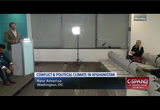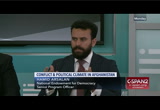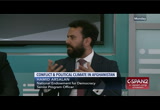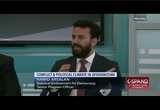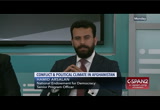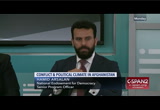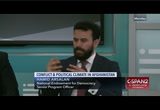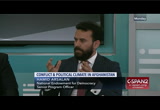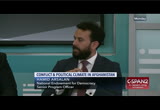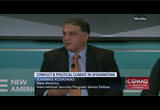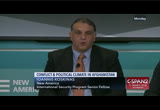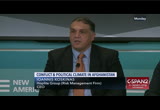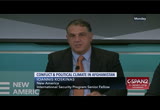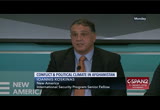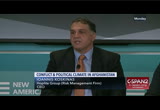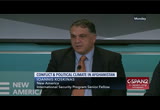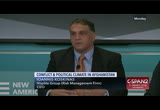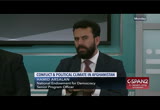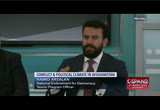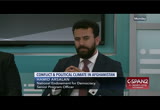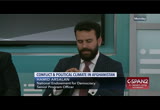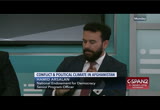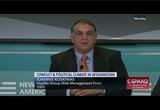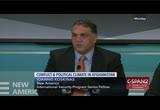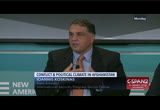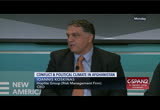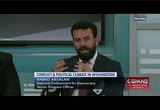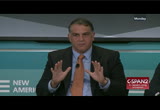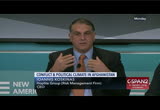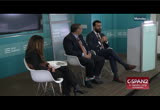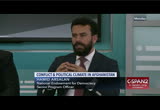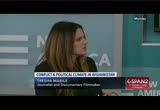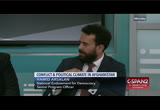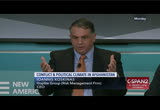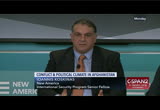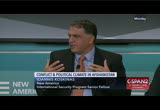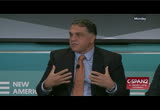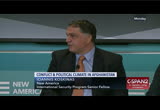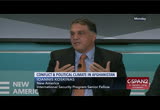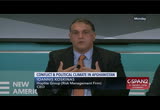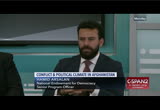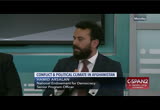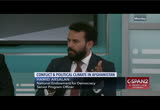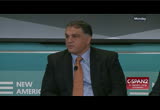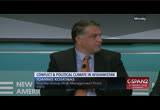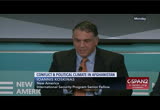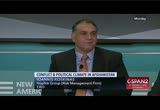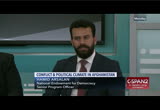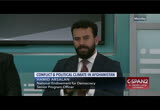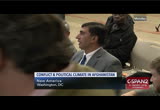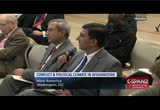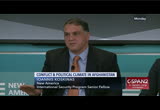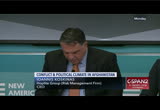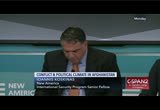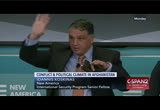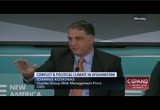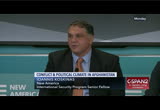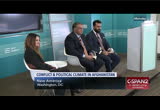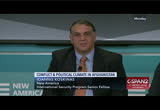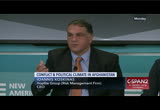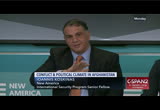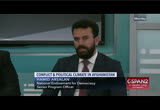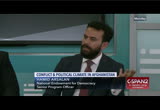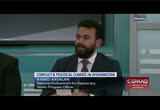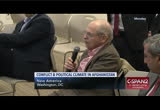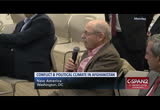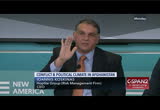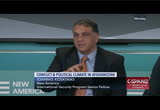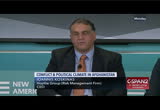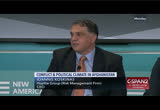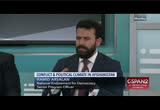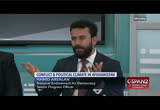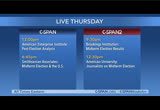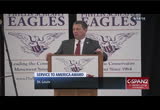tv New America Discussion on Conflict Political Climate in Afghanistan CSPAN November 8, 2018 7:45am-9:03am EST
7:45 am
for votes on coast guard programs and nomination for federal reserve board. you can see the house live on c-span and watch senate live on c-span2. >> i thought about forgotten presidents before i began the book and then it occurred to me there might be something other presidents had in common. they were forgotten but also significant in some way. >> this week on q and a, university of north carolina constitutional law professor michael gerhart talks about two of his books, the forgotten presidents and impeachment. >> bill clinton did a lot to merit his own impeachment. i think he new members of congress were looking for him to make mistakes and when he made those mistakes and later testified under oath in a way that was false for which he was later held in contempt by a judge for perjury bill clinton made his impeachment almost inevitable.
7:46 am
>> sunday night at 8:00 eastern on c-span's un day. >> next a look at the political climate in afghanistan and us environment in the country since 9/11. from new america, this is an hour. [inaudible conversations] >> good afternoon and welcome to new america. my name is peter bergen. i run the security program here, we brought assisting wish to panel to discuss afghanistan in the next year or two. we had parliamentary elections and we have presidential elections next year. we had insider attack that almost killed -- that killed a general who was a police commander in kandahar, general scotty miller, 4-star general
7:47 am
in charge of afghanistan, indicative of good intelligence to carry out the operation. we begin with the moderator tresha mabile who has been visiting since 2007 it made a film for national geographic, cnn and the taliban and both in afghanistan and pakistan in 2008-2009. next to her is ioannis koskinas who lived in afghanistan since 2010, in special operations command for the air force for general stanley mcchrystal and set up a group that was involved in mining in afghanistan and security, phd in london about the afghan civil war which -- so much of what is going on in afghanistan is traceable to what happened in the 90s.
7:48 am
finally, hamid arsalan is a senior program officer, a un official in afghanistan and c-span is covering this live to tape. if you have a question wait for the mic and identify your self so c-span viewers can understand. i will turn it over to tresha mabile. >> they are going to give a short -- >> thank you to the foundation, this timely event in afghanistan and i went to thank you for being here despite the rain. i will begin my remarks with a disclaimer that my views are my own.
7:49 am
as peter mentioned i returned from afghanistan over the weekend. i was there to observe the elections, it was not a formal observation mission. i spent most of my time in kabul. but before i discuss the recent trip, i wanted to tell you a story and frame my remarks, story that happened in 2014 when i was observing the afghan elections. in 2014 as an observer i was based in the western part of afghanistan. i received a call that 11
7:50 am
individuals on their way home to their districts, their car was pulled over and because their fingers had the income from the elections the taliban and shopped them off. when i heard this story, i need to go. i went to the hospital, and meeting with most of these victims, one of them struck me the most. and older gentlemen, late 50s, he was smiling it in my mind this guy must be crazy. he is smiling so i approached him and talked with him and he smiled, the taliban and chopped off one of my fingers but i have 9 more so i can vote 9 more times. this gentleman may not even know what democracy is.
7:51 am
but i think the story is the story of millions of afghans who have embraced this new afghanistan and with their participation and resolve saying no to terrorism that is presented by the taliban, other terrorist groups and their regional backers. that story and that resolve was demonstrated by the parliamentary elections. as an observer i have witnessed long lines who seemed like all the rest to participate in the elections. there was another individual in one of the polling centers who could not find his name. i was there for an hour and i
7:52 am
could see this man going door to door saying i have this on a piece of thread but my name is not here and i want to vote. like all the rest they demonstrated they came in millions and participated. another incident in one of the polling centers, a bomb went off. it was amazing how this individual waiting in line, they did not even move. they waited in line to exercise their right. there were technical issues with a new biometric system,
7:53 am
there were some delays and people who were trying to cast their vote but overall made the process more transparent, it was designed for a polling center seeing ballot staffing in afghanistan but as we were talking earlier the biometric system was introduced, there was not enough time for pooling staff and others, there were long lines where polling centers had to be reopened. talking with afghans and afghan civil society they saw the process as a victory especially that there were a lot of young
7:54 am
afghans who were employing a mechanism of obtaining, bringing their families and kids, door to door around the country so it was remarkable on that front. when i was there, with the taliban, many of you know, some contacts and some meetings with taliban representatives and probably in russia. a few days, no afghan officials participate, and representatives out of the council.
7:55 am
and a few key things on that front, they do want to have demonstrated how forgiving they can be and when the cease-fire happened in afghanistan i was amazed by how forgiving, during 3 days of cease-fire, close to the villages and city centers and they didn't forget the atrocities they are committing. there was no single incident of having a taliban member,
7:56 am
basically -- they have peace and the peace process should not be a top-down model. it should be a model where they are engaged from the village on the district level to the prudential level, the afghan civil society, the civil society, media groups, they have to feel included in this process. i don't think we can achieve peace in afghanistan behind closed doors. when it comes, the negotiation process, there are talks and in my view those have to be asked and owned and led from the process, long-lasting. i will be happy -- >> thank you.
7:57 am
>> i will echo your comments that in this town there are not many organizations paying as much attention to afghanistan as they should. new america is very supportive of that. i deeply appreciate it. c-span has always been good about supporting this. this is quite a treat to get representatives, and afghan voice and someone who is obsessive about afghanistan but resides in kabul most of the time but i a product of western dynamics so i hope what i can add to this is a lens of how we view this from here to afghanistan and in afghanistan. i will let hamid arsalan handle
7:58 am
what the pulse is like, from not average but very informed afghan on what is going on. with that in mind, let me just throw this starting point to the discussion and look forward to churchill's question that the audience's questions. we just had an election at the end of october in afghanistan. there is an enormous amount of hope and courage that was represented by the afghan people in going to the polls. inefficiencies aside, the last few weeks, this has been one of the most anticipated votes in the last five years, the parliamentary elections were two years plus late in the making. the fact that they were held at
7:59 am
a starting point is important and the west views that as a milestone albeit not efficient or however else you want to characterize it. the second milestone the west is paying attention to is the presidential election at the end of spring which is another of those that conditional support towards afghanistan is based on achieving certain milestones and the south asia strategy, one can argue what achievable is or return on investment, but certainly on the macro scale these two events are quite significant and they are significant for another reason. tomorrow we have elections here in this country, our midterm elections.
8:00 am
whichever side you lean on you may have different opinions about what is going to happen and the -- the informed opinions, we are not exactly 100% accurate during our presidential election so there will be some surprises i am sure but nevertheless, it will be a policy reflection based on this election at least in congress. ..
8:01 am
i think it's going to become a much more interesting for the president of reelection post this election so he'll have more time to spend on it but let's not forget president trump, his initial gut feeling was not to support the expansion of the mission continuance of the mission as it is now. he was convinced to stay the course and afghanistan, and in some ways reintroduced certain capabilities and put more attention on it. that is not guaranteed. that we stay this way but he changed his mind once that he could possibly change his mind again. something we need to take stock of. again, in the characterization of what just happened, great importance, and what's going to happen in may is also superb, supremely important. that how it is viewed here, there's a lot of skepticism, a lot of concern about whether or
8:02 am
not mission is still worth that. it. went to earn it every day. for somebody who is an absolute supporter and believe in the mission, i committed my life to it, that afghanistan was sovereignty and, quite frankly, the freedom that it represents there is the beacon that we need to reinforce. but we have some work to do because i think the odds are completely stacked against us always in the context that people are looking for reasons to not stay, not necessarily looking for reasons to stay. what a hope this discussion brings is it reinforces our least in my mind, i'm sure you would agree, there are many, many reasons why we should stay. and in cost if we stay out. with that in mind i'll pause there and look forward to your questions, tresha, and, of course, the audience. >> this is a question for both
8:03 am
of you. if you're the wife of the 39-year-old 39-year-old mayor of utah who was recently killed on an insider attack, how do you tell your children why it's worth it for us to be there or what it was worth it for him to risk his life in afghanistan? >> i can take that. because look, i have served in the military. i've been around families that have lost. i was literally just down in florida for the induction of staff sergeant, later master sergeant john chapman who basically gave his life on roberts ridge in eastern afghanistan on the early days of the war in 2002. and i was there with the family and all the gold star families that they could muster were there. and i can tell you that they feel pride in the sacrifices that their family members made.
8:04 am
they believe in what they did because those individuals that went there believed what they were doing was right. and i think that, you know, i get chills even thinking about it because if i didn't believe that, i wouldn't be there. my kids who are probably going to watch this because they always asked me when c-span's going to cover this, so to my kids that always see me leave not be around them as they are growing up, to my partner, to my mom, my dad, the rest of my family, all of them sort of believe that what i'm doing is important. so to that young wife of seven kids, it's not easy. i'm not downplaying it but i think that there's entire support mechanism that believes in what the person did and what he was going after and, quite frankly, i do, too. anything she does. i think the children will.
8:05 am
there will be all of us that will continue to remind them that their dad sacrifice wasn't for nothing. >> hamid, what happens if the u.s. leaves afghanistan? >> let me add to what ioannis say. my deepest condolences on a personal level to the family of the fallen soldiers. but i just want to add one thing that the afghans alongside with american friends they are fighting this war on terrorism, 20 plus terrorist groups facing on the front lines on a daily basis. there are tens of afghans who are losing their lives basically fighting this terrorism, but like ioannis say, their loss is not basically wasted in afghanistan. i mean, if the u.s. were julius afghanistan, i think afghanistan is not going to go anywhere.
8:06 am
afghanistan has been there for 5000 years. the afghan people have been there all this time. but the fact is that the afghan government, the afghan state, right now we are not in the states to be self-reliant. we don't have a strong economy to be able to support our military forces, at least in the next two years. afghanistan does have a lot of resources. as you know we have a lot of minerals, but for us to be able to extract those minerals, to be able to pay for our army, our police and for our state bureaucracy, we do, until then we do need basically the sport from the united states and other international partners. just recently, like a couple of weeks ago. washington we had a couple of mining agreements that were signed between afghan and american companies and afghanistan to be able to extract basically those minerals
8:07 am
out of afghanistan. the level of trade and export in afghanistan has increased significantly because of the air corridors the president was able to negotiate, exporting products to europe, to china. basically afghans are trying, they know the problems of afghanistan are the own problems and they have to own it. but if the u.s. were to abandon afghanistan, i mean, we are in a region where we are not, we don't have so many friendly neighbors moving towards us. i think there are a lot of regional actors who do not want to see a democratic and a stable afghanistan. i think they would probably want to see afghanistan, to treat afghanistan like a client state and that's that something the afghan people wanted. we have demonstrated that in the bilateral security agreement that the afghan government has
8:08 am
signed with the united states and a strategic partnership agreement i was talking about earlier, that when the strategic partnership agreement was signed between axis united states and the afghan government, the grant assuming that took place when more than 2000 delegates from all of afghanistan came to be part of that discussion, there were so many individuals who were trying to kind of like derail those talks, that this partnership is not fixated in u.s. and afghanistan, but overblown majority of afghanistan said yes, have strong relationship and this partnership agreement basically with the united states because they know what the alternative is. the alternative would be chaos and probably more intervention. so i do hope that all the investments we have made in afghanistan during the last 17 years, both in terms of blood and treasure, will be able to protect them.
8:09 am
i'm also a businessman from a business perspective we have invested so much in afghanistan. i mean, the level of troops in afghanistan is not nearly as much as it were in 2014. we have a small foothold of troop presence in afghanistan. the level of expenses have come down anything during the next few years the number of troops even they, gradually lower in afghanistan. the afghan security forces will fill in. so until that, where able to completely protect the country we will definitely need some support from the united states. >> let's talk about talking to the taliban, an idea that's been thrown around for 17 years now. are you optimistic about the current talks? >> no. i mean the simple answer is i am
8:10 am
not optimistic at all. in fact, i don't think that we should be talking to them in this format whatsoever. my initial thought with it was the talking is good at all times, and maintaining a channel open for conversations, even in the darkest moments of the cold war you still had conversations between rival nations that were ready to push the button and go the wrong direction. but we have built these false expectations that negotiations are just around the corner. and, unfortunately, this sort of notion reinforces the worst sort of tendencies in this town because people want to get out.
8:11 am
we almost are setting ourselves up for a really rather be careful what you ask for, because we are talking to, we say we are talking to afghans who will are just have an alternative view of what's going on. their voices deserve to be heard, too. i'm sorry, when things are going boom and their killing thousands of people, there is no talk that's going to make that thing better. at one point, okay, that's fair. at one point that should happen but not now. as hamid very accurately described and, quite frankly, i've been very adamant about, they are a terrorist organization and until they start behaving otherwise, then we should treat them as terrorists. the last time i i checked we dt negotiate with terrorists, or at least that's our mantra, no
8:12 am
matter how we maintain some quite conversations at one point, so through interlocutors, that's there enough but not this reconciliation. in fact, i would go a step further to say it undermined the afghan government, in my opinion. because when we send our ongoing -- envoy to qatar or talk about the russia talks with no official representation from the afghan government or wouldn't have these conversations as if we are talking to yet another government in waiting, it's absolutely nonsense. we're going to actually damage the integrity i think of the state that we are actually trying to uphold and strengthen him should be objective. i mean look, insurgencies are at the very core a competition. it's the competition for the masses, the dilemma, you know, that somebody may have in terms of joining the government or
8:13 am
supporting the insurgency. the way that we help our skin better is not by engaging with the insurgency at stages where their killing people but by strengthening the government and making it much more attractive for the average afghan to decide and to stay with the afghan government rather than somehow make it appear as if there's some legitimacy associate with the afghan taliban. so that's my take on it. >> i was born in war. i grew up in war and i have experienced atrocities of war and what wars can do first in. like me, millions of afghans do want to have peace, but the cost of peace has to be defined. what cost should we have peace when they are killing us
8:14 am
basically on a daily basis? the student of conflict confirmation, unless the initial sanctuaries the taliban enjoy across the board in pakistan, and less -- [inaudible] and they have basically across the of the set of the border i think will be very difficult to any sort of like settlement that we will be able to reach. i think i want to go back to the point that how forgiving afghans are. when we demonstrated that during the three-day cease-fire. but i agree with you, ioannis, that the afghan government has to be strengthening the inclusions of government. they should be able to provide services for its citizens across all parts of the country. and i think it's good and it's okay if there are basically talks, but when it comes to the negotiations itself, like i say,
8:15 am
it has to be the afghan government, the afghan people. like, they should feel their owning this process if you want to long-lasting peace. if there's going to be something on a piece of document, that's not going to last is a civil society, media, others don't feel they are a part of it. >> can i add one thing? because of me to say, you're exactly right. afghan people are very forgiving. certainly will they are incredibly forgiving when you approach them with an open heart and you approach them with the desire and the respect associate with forgiveness. they are also very unforgiving and revengeful if you take the exact opposite approach and there is no remorse and there is nothing of the sort. we have to be careful because, look, the marines went down to
8:16 am
helmand and they achieved a lot in 2010 and 2011. there are a lot of afghans that stuck their head out and believed in the concept that we are here, we are going to be with you, we will help you out, and then we left. there has been a bloodbath and a lot of those towns because of what happened. we can say that about other places, too, and the point here is that forgiveness is an incredible concept that belongs with people that behave in norms, you know, within norms. when somebody comes out and actually behaves in that way, i'll be as forgiving as anybody can be. i will be the best afghan in that context, but when they don't and they are killing people left, right, and center and a a great example of the three-day cease-fire, a free afghan i know had the greatest
8:17 am
admiration and sort of good hope that this is a change. but do you know what, those people started killing at alarming rates immediately after that. so they know how to switch on and off, okay? they haven't switched off. when they're ready to switch off, let's talk. but when they are not it's a real troubling sort of perspective. >> do the people trust the taliban? >> i think the taliban, they know that they do not have the legitimacy per se like in the whole country. i think in pockets of the country they may be able to control country and able to have their own structure of governments. in my view most of that is through intimidation and fear. i think the last 17 years the country has really, really transformed. like two-thirds of the afghan population basically under the age of 35. it's this to afghanistan who
8:18 am
enjoys a vibrant civil society and access media outlets and so forth. a lot of developments have happened. in terms of trust, i don't think the afghans, they trust them. and i think we should beware that the war that literally we're fighting in afghanistan, it is an imposed war against afghans. if the taliban want to have peace, there's the afghan constitution. literally a few thousand, let's say 10,000, 40, 50, 60,000 people, we shouldn't have this notion that you mentioned that there is a rush the process that you're in a hurry to be still with the taliban and bring them into the system of governance. if the taliban want to be part of the process of governance in afghanistan, they should come and participate in the elections. we have a a presidential electn scheduled for april 2019, and they can come and run but i
8:19 am
think they know that they don't have the legitimacy. >> to the afghan people have hope? because in 2007 and earlier, after 9/11, afghanistan was such a haven and such a great place to be, restaurants, shops. i i wonder if that still exists today. can people go out and walking really enjoy life? what went wrong between then and now? why are we in a position where there's so many attacks in kabul? and for a lesser it doesn't seem like a safe place to be. >> i will begin. for me as an afghan american of course have to be careful, like where i go. but life really is normal. restaurants are open. they are open, people go out to dinner, they have parties. when i was in the country
8:20 am
literally it was a bomb that went off that caused casualties and i got a few hours later that there was a dinner. me and ioannis were talking earlier, the normal thing that is there is not the same as normal that you and i probably would experience here in the united states, in washington. but overall i think they are very resilient and life goes on in afghanistan despite all the conflict and everything that's happened in the country but definitely there is life. there are enjoyments. use wedding celebrations, parties. but overall i think, i mean, i don't want to paint a rosy picture. there are challenges associated in the country as well, economic challenges, security challenges and so forth. >> there's an element, my trouble is i straddled to
8:21 am
macworld. on the one hand, having gone to afghanistan since 2005, there are not many airports that i feel like i land in, and as ridiculous as it may sound anybody here, i land in that little airport in kabul and i walk out and agreed the air and i feel like i'm home. you walk a little bit further and you see this ridiculous fountain light or structure of dolphins in a landlocked country and i chuckle every time i go through there, but it's a chuckle at somebody actually feels like this is where i live, this is were i feel most comfortable in. so maybe i have grown comfortable in that environment, but the truth is that it is getting more dangerous and afghans are very resilient and, quite frankly, they don't back
8:22 am
down from challenges so the learn now to live with new norms. but at the same time it's challenging, particularly outside of kabul. there's probably an attack happens in kabul and there's definitely some mass casualty attacks that happen, but for the most part on a day-to-day basis it's probably parts of d.c. that are more dangerous than parts of kabul. the truth is that you have to be conscious of you are, where you are, and how you may be targeted in kabul, but it's outside of kabul that is far more challenging. the roads are difficult. you go 50, 100 meters left and right of a major highway and jensen challenges. people, this is the stuff that we can say we control the population centers and everything else, but afghanistan
8:23 am
is more than a city. and the truth is that we downplay the control that afghan taliban may have over the areas in the countryside, but the reality is we need to get that back because that's not, that's the heart, you know, in many regards of peoples homes, their villages, their ability to reach out to them is kind of important. so in terms of the security, there's challenges. in terms of hope, to your original point, look, hope is, you know, if mining or minerals is a great abundance in afghanistan, i only wish we could monetize the incredible hope that is in that country because that's perhaps the greatest sort of resource that it has. huge. it's immense.
8:24 am
where we fall short of is delivering on promises that keep that hope. and when that happens you allow other elements of society to feed on the lack of hope or the lack of progress, and create the negative things that diminish help. >> are other countries filling the gap? tell us about china and russia and iran. what's happening in the region? >> here's the thing. it's actually interesting to observe as an american there. we go there with the greatest intention, and other countries may feel otherwise but i wish we were a little more nuanced and our approach. i wish we were a little bit more like hey, we are helping out so much, maybe the mining should not be, we should attract western firms because western processes, we should attract western firms, canadian, american, british because not
8:25 am
only did we just bled there but there's a lot more aching to social responsibility, different practices for the environment, all those things. i wish we were a little bit more nuanced about it. unfortunately, we go to with the best intentions of doing right and good and all that other stuff. other countries are not. they are predatory. china is not there because it needs to create some sort of silk road that benefits afghanistan. my god, they are there like locusts to take material away from that country. as long as there's a a benefito the afghan state, quite frankly, i'm okay with that as long as it's not a predatory practice where they promised some kind of royalty rates, for the example of mining. they promised some sort of royalty rates. they promised railroads. they promised, they promised, they promise, and then they see
8:26 am
a weekend afghan government over the years and they come in with predatory behavior as well, that was 17%, let's go with something much, much lower. or you know that rea road about i promise? it's not going to happen so soon. so now we have these predatory behaviors that are not benefiting the countries. russia, come on. russia is not afghanistan sprint. there's quite a lot of data that supports the concept. the idea that somehow they are in different some kind of interest is ridiculous. iran has legitimate concerns. it has a border to get his water issues is all sorts of things but i do looking at it from a let's help a brother out? i'm not so sure. pakistan, you think about that. they have been -- the father of the taliban was killed a few days ago.
8:27 am
he's walk amongst them. these animals, these people that are then responsible for so many deaths and so much destruction are walking around like it's nothing. they were jumping up and down when he was killed. they were having, they were doing a dance. they walk amongst, so that's what i have challenge is these countries may have legitimate national interest, and we should consider that. but when they're doing it in a way that actually diminishes the strength or the argument of afghanistan has a right to exist and to prosper, and they take predatory behavior, i'm not cool with that. >> i will defer. >> is ashraf ghani a a good leader? is a popular? >> i mean, my personal view, i
8:28 am
think in my view i think it's a good leader. there are some on the political elite side, there may be some disagreements, some people may not like him. so when i was in kabul actually i had a breakfast with an individual, a businessman. this man, of course he knows the president. what he was telling me, look, as a businessman i feel like i can do business better now because there is less corruption in the government in afghanistan. so i think he is trying to thing the president of afghanistan is not an easy task. i mean, he is active, he is engaged. of course i'm not, i haven't worked with him closely per se but have a lot of friends who work with him, who share basically his vision for the
8:29 am
country. so he does have a vision for the country. he is working hard for, from piece to making the country reliant in the long term. like i say, there are like in every i guess administration, in every company you your oppositn and you will have people that may not necessarily like your style of governance or your style of leadership. but he is not corrupt as a president. he is trying hard i think too i guess bring peace to that part of the world. i think one of his biggest achievements i would say is that in terms of foreign policy, that he went on and he made it like really public that we have this undeclared war with pakistan. like he brought that story from washington to brussels, to others, and brought it to the
8:30 am
international community attention that we are dealing with this kind of post war. the afghan revenue has increased by 60%, like revenue collection. just recently, a few days ago the world bank was doing business indicator that was published. afghanistan has jumped 16% compared to last year basically in terms of making the environment of doing business in afghanistan better. and then other regional initiatives that have taken place under his government and the previous governments, but mostly under his leadership that he pushed past on that, electric grid that he is worked hard and pushed for, the gas pipeline, if it were to materialize in afghanistan. so overall i think in a nutshell i personally respect that.
8:31 am
i use a lot of his work when i wrote my thesis on nationbuilding, and to think he means well and he is doing, working hard to making that country a better country. >> one more question before we opened it up, but ioannis, if somebody asked you to breathe the president on november 7 on why we should stay in afghanistan, what would you say? president trump. >> the short answer is it's in our vital national interest to remain in afghanistan, because leaders like that, like short, concise statements. i would say the taliban would probably allow the same safe havens inside of afghanistan of terrorist groups to remain or readjust themselves, to orient themselves back there. there's a pocket of isis there
8:32 am
that is of a serious concern, not just to afghanistan but to the region. and by extension to our national interest. we shouldn't forget that although people say that they are only about 120 al-qaeda members in the region, we keep killing a lot of them and they seem to stay at the magic number of 120. same with the magic number of about 1800 isis that we keep on killing them with the mother of all bombs and operations, a couple hundred at a time but somehow someway they retain their numbers at about 1800. so the numbers games play, really, the point is the numbers really don't matter that much. the matter that we have, we have a terrorist, terrorist of pockets still there. the last thing and this is
8:33 am
perhaps counterintuitive because it's really easy for all of us to throw the big, you know, but if it was a for pakistan's over there, everything would be perfect in afghanistan. the fact is that we need to be in afghanistan because things are not that stable and pakistan. it's a different country. it's a very important country, quite frankly, and if hundreds of millions of people there. we're seeing the violence associated with asia bb was actually released by the judicial system of pakistan because of some last-minute laws but there's a challenge, a friction between extremists in pakistan and what i consider the moderate state of pakistan. and so allowing this afghanistan
8:34 am
to dissolve into some kind of a spiral that allows things to deteriorate to wear an extremist organization such as the taliban is taking hold is not going to help actually the situation in pakistan, as weird as that sounds. i think it's actually going to create more of an extremism drive. it's not in the interest of, i argue, i know i'm in the minority at times, that it's not in the interest of the pakistan state to have afghanistan fall apart. there's so many dynamics to this, and in know i've gone past my little executive summary to the president, but you could just sit there item after item after item after item why the fight matters there. and it's the fight that matters there. it's not so much the government that's in power right now or the
8:35 am
one that's going to come in power in may. it's actually the fact that that space is a troubled space, and we need to be conscious of the fact that it needs to be stabilized. >> if i were to say to the president, i think i would tell them that, mr. president, let's not make the same mistakes we made in the 1980s. there's this famous quote from brzezinski, back then he was a national security adviser, to say when the soviet threat, like when the soviet union was dismantled or destroyed, he says that the world will remember the liberation of eastern europe and the fall of the empire. the world will not remember a bunch of thugs, referring basically to the freedom fighters. he couldn't be more wrong. once the u.s. abandoned
8:36 am
afghanistan back then, that created that security void and led to al-qaeda coming in taking over afghanistan and the taliban wing of basically the rest of the story. my message to the president would be, let's not make that mistake that we did in the 1980s. right now and afghanistan i think we have a reliable partner. there is a partner who is willing, the afghan people, they do want, they do want the united states to stay in afghanistan. i often say this analogy, we want to be, afghanistan once to be a south korea for the united states in terms of the strategic relationship in a north korea like neighborhood, you know? so i do hope that message goes by. >> thank you. any questions?
8:37 am
and please state your name and your affiliation. >> i have a question which all trial to be as short as possible with three parts. first, it seems everything is going to a good extent, good in afghanistan. how would both of you respond to that sigar report at least on the 30th of october which has more than 55% or less the net is the control taliban? secondly, corruption, drug at all of these internal to afghanistan. and u.s. has no primary objective in afghanistan and that's why probably this is happening that there's nobody in the washington, d.c. that's the first perfect secondly, you talked about the sanctuary in pakistan and pakistan always, the last two years all the terrorist attacks which were reduced considerably in pakistan originate from afghanistan. that means afghan as follows you
8:38 am
site should be supportive of the board of management which pakistan is right now doing individually come spending millions and billions of dollars. dollars. so why do we not see support from the border management because it's going to greatly reduce or curtail this cross-border acquisitions? last one, just a déjà vu regarding the taliban. i would prefer to statement where she clearly spells out who created the taliban, finance them about to come three decades ago, and what are your comments on that critical aspect? >> do you want me to start? okay. i think i understood the first one. i'm sorry if i didn't come if you don't mind making sure i clarified. i don't think i've indicated that everything is going great
8:39 am
in afghanistan. i think to the contrary. i think we are in a rather dangerous glide slope towards negative outcomes in afghanistan. the sigar report, i have read most of it and have to say that it sounds reasonable. it sounds reasonable that the percentages of taliban controlled territory or for sure contested territory have gone up here i think it's probably a little bit rosy in its approach. i think that we tend to put the plateaus and like government controlled territory as in comparison to more nuanced perspective. i could tell you from my vantage point of visiting the country and seeing different portions of it, i think it's much more
8:40 am
dangerous than the sigar report. so the first answer is that, we have to face the challenges and not pretend that they are not there, but i think we have hurt our efforts by, quite frankly, suggesting that we're somehow arresting the taliban movement, you know, , momentum. we haven't. i think they are quite strong. in terms of the corruption, so i don't hog the entire time, i'll just mention this and i'd be more than happy to discuss this with you at length. i think what happens with corruption is about, number one, if you don't tackle it, it's going to continue and get worse. but at the same time when you put pressure on the system that's already under extreme pressure and there is no clarity in terms of our we staying or
8:41 am
are we leaving, corrupt people will go and eat more. they will gorge themselves because they think that they are limited amount of time and, therefore, it just becomes an even worse situation. that's what we are experiencing in some ways. there are some areas that have improved but in many predatory behaviors that are happening, i think it's probably not so positive when it comes to trending. afghan border management, actually, look, a very firm believer and admittedly this is a talk about afghanistan but he can't go without mentioning pakistan. i'd like to identify afghanistan and it was some afghan province first and then we can talk about the external challenges and handle it in pockets. but the reality is, as most of these things happen, i'm sure
8:42 am
you have expressed it, it all gets mixed together. the border control issue is absolutely imperative. i think there are legitimate concerns about afghan safe havens on the afghan side that impact pakistan. i think those are legitimate concerns and, quite frankly, i don't think many people would argue that. i think what most people would argue is the scale of that grouping, that it acts against haxton versus the scale of what is perceived as groupings that affect afghanistan. you're exactly right, there is a concern that needs to be handled. handled. and i'm an advocate of the border control. however, people tend to get into this durand line issue, as i'm sure you understand, that that sort of solidifies some of from afghan side i claim that they
8:43 am
don't adhere to. as an american, if i is going to again advise my present i would actually say that rather than dealing with reconciliation with the taliban, should we talk about reconciliation of issues, key issues such as those because those can reduce friction between the two countries instead of amplifying friction in some ways i did with the insurgency as a primary issue, rather than a state to state consideration that needs to be addressed. lastly, in terms of who can create a taliban come on that show that that's the conversation that we really want to have on this one, but i butd say that what really started the taliban was the failure of the post, you know, soviet afghan experience. what started the taliban was the seven mujahedin groups or couldn't get their act together
8:44 am
in the civil war that created. there's also evidence of though that pakistan in its national interests, that something that we have to take stock of in its national interest, and created the state that my country has to continue afterwards. did we screw up in the beginning? absolute. the way that we left, 100%. it's irrefutable we should've done something different with the benefit of historical review. but when it comes to what happened afterwards and the fact that we dealt with a 9/11 in no small part because of the safe haven in afghanistan, i think there's plenty of blame to go around on who created them. i just find it offensive, quite frankly, and maybe it's distasteful for you to hear but i find it offensive that we're not arguing about substantive issues, such as how do we resolve challenges rather than
8:45 am
talking about, hey, could you help us out with the reconciliation with the taliban? that's like asking someone if you can help me with bandaging my wound not helping me with my cancer that i'm dying from. so sorry for the long -- i hope i answered it. if not, we can talk later. >> i think you answered. >> time for one more question. >> thank you for coming out and thank you -- john began is my name. thank you for coming out and sharing your perspectives. my question is almost the chance for a message at the same time. i think it's fair to say that the united states our western democracies have a waning support for the ongoing war. which part of the coalition strategy do you see as working,
8:46 am
and how can you craft persuasive message to stay the course? >> great question. >> okay. look, we waited far too long to create what's considered the modern afghan army or afghan police. we were quite bulky in the way that we sort of put together 350,000-ish security forces that are supposed to protect afghanistan. when, in fact, the truth is that a lot of people are dying, but only small portions of that is actually effectively fighting the insurgency. i think we need to have a reassessment of our long-term strategy towards afghanistan. i think that we need to address
8:47 am
very specific fixes. we cannot handle a thousand casualties over a couple months in the afghan security forces. how do we fix that? those are very specific things that we need to address. we had eight helicopter accidents since march in the afghan security forces. that isn't normal, even in a wartime that shouldn't be the case. how do we fix that? the deployed advisors, there's rumors by the sigar that perhaps they're not receiving the adequate training. i'm not sure if that's accurate or not. i don't have the figures but if that's the case, then shame on us because we know that the advisory support mission is the primary mission in afghanistan. if we're not putting sufficient intellectual capital and putting the right people there, then mistake. to answer your question specifically, we have to specific answer to all these
8:48 am
things. right now we are sort of still in, you know, there is no military solution. it's got to be political. i think general miller has finished up his assessment of the situation, as every commander does, and odds are, and having known general miller for quite a long time, i'm sure is going to come with very specific answers to fix these problems. he's not way big brushes kind of person. he's very specific. i hope we get that very person because we are running out of time. >> just to add to what, in terms of the development of the afghan security forces. there's a big transition that's happening on the air force side, that the afghan army, they are transitioning from the russian helicopters to an american based, 150 plus black hawks
8:49 am
better going to be given, already pilots receiving training on that front. that is also a significant. quick point, referencing basically sigar into the taliban controlling 55% of the territory in afghanistan. i personally believe that it's debatable, from the 34 provinces that afghanistan has, the central government is controlled basically 34. but if there are some districts that the taliban are controlling and there are some home that are contested, and that's an issue that can be discussed, but overall like even in those areas the issue of governance, do they really govern those areas? you mentioned border management and taliban operating on the other side of the afghan border. from my understanding the afghan
8:50 am
secret forces have been very cooperative with the pakistani government in terms of addressing some of these pakistan taliban leadership and him them over, basically on the other side of pakistan officials. i think on the other side from afghan expectations that has been that the pakistanis reciprocate. i mentioned in my remarks, from afghan perspective there shouldn't be good or bad taliban. good taliban to going basically fight in afghanistan, bad taliban who kind of our fighting the pakistanis. so really i think, from people to peoples relation, if you were to say neighbor relations, the afghans do want to have a good relationship with pakistan. i think when president ghani took office he literally broke protocol by going to the army chiefs office trying to ask the
8:51 am
pakistani officials and others in helping him bring the taliban to the negotiating table and help in the peace process. you reference hillary clinton and taliban gratian. ioannis address that and maybe you can bring that question to secretary clinton. but border management, i think deathly an issue that needs to be discussed on both sides. i think you mentioned -- i'm not going to touch it now. [inaudible] >> i was going to clarify. [inaudible] >> and it's actually, it is contested.
8:52 am
[inaudible] >> appreciate those comments today which were really, we don't hear them here. i might have phrased it somewhat differently, but i think it's important that we do that, as you say, otherwise we set false expectations. i wonder whether the basic problem with the gauche asians -- negotiations, where under the assumption, what it is, the taliban just want a better deal. that somehow if we gave them the right combination of concession concessions, that they would say, well okay, yes, we will have a political party now and we will enter the political
8:53 am
system. isn't the real problem here is the taliban, some and the taliban keep telling us can we want an emirate, and what the restoration emirate. yes, there will be a little different than it was before. we learned some lessons but that's what we want. if they wanted some kind of power-sharing arrangement they could've had that anytime over the last six, seven years. the terms might have been a little different. just to conclude this, more of the, than a question, i'm afraid. it strikes me we can get an agreement with the taliban tomorrow. they will sit down with us if we're willing to do it on their terms, not ours. we're asking them to do it on our terms and why should we be surprised that they won't even sit down to talk about peace, much less conclude peace?
8:54 am
>> a couple ad hoc sort of things. first, i'm sorry, john, i kind of brush your air force portion of because attained over focus on air force because i'm a former officer just like you. i actually think if we didn't have the air component at this point the percentages would look a lot different. so i think the black hawks, it's going to take some time for them to get up to speed. the ac 200 eighths that are coming in are probably going to come quicker. the 530s, the c-130s, all that stuff, the a 20 nines, they will keep on being to get voters need to strengthen that. we need to send the right people. i think you raised an incredibly important topic in terms of the reconciliations. one of the reasons why i don't think that it's the right time
8:55 am
is, number one, like i said, i don't like getting in conversations about resolving this while being shot at. but the reality of it is i'll take it if i think there is something real. i just don't think there's anything we like to sit. when you come up and say we want the u.s. out completely and we want, they consider the government of afghanistan a puppet regime that is not legitimate, and they want to completely bring in a regime change. so there totality into their changes acquired for this to work may be a good starting point, like hey, i'll go high, you go low and will meet in the middle. where not my carpet. this is actually something much more significant. i think you're right. i'll say in closing, it's
8:56 am
because assume where we are, what, president trump was able to see the two koreas meet at a point, dmz, where everybody said it's impossible, you know, that it's going to happen. and they did. i think for all that we can say about tweeting and everything else, he has achieved certain things that are, we didn't believe. you can be pro-or against but certain things he achieved in terms of the starting point. i'm not saying we've actually achieved peace in korea. i'm not saying we've achieved the reality has materialize, but there are some things that have happened. when it comes to afghanistan i
8:57 am
think he was persuaded to do the right thing. i'm obviously biased in my opinion, but we need to keep on adding the right mechanism for him to stay engaged, or otherwise we're all going to suffer. pakistan is going to suffer. afghanistan is going to suffer. iran is going to suffer. this is not good for anybody if afghanistan goes down in flames. so with this i appreciate again new america's take on this. tresha, thanks for hosting it graciously. seriously, a pleasure being on stage with you, and keep up the good fight. we need people like you involved. >> thank you so much. also to share a few things regarding your question i want to highlight to you and the audience are watching this probably live. afghanistan of 2018 is that the
8:58 am
afghanistan of 2001 or 2000, or the '90s that the taliban had their emirates. so that is something we have to be aware of. this afghanistan of 2018, on any indicator you put the country and, politically, economically, socially, you see advancements and improvements in the country. we have more women in our parliament than the u.s. has in its congress here. there are more women in cabinet positions in afghanistan and even we have here. vibrant civil society, media. of the drink of the taliban to have this emirate as i think remains probably a dream. one of the quick point on the taliban. in my view the taliban are not independent thinkers. i think the smart question is to ask pakistan, what is it pakistan wants from afghanistan and their assistance to a
8:59 am
basically bringing the taliban to some sort of a negotiating table. so one last point i think in closing, afghanistan genuinely has moved forward. they are embracing regional initiatives. they do, afghans, they do want afghanistan to be developed and prosper. they want to be living side-by-side in a peaceful neighborhood with pakistan, iran and other neighbors. the taliban, if they want to come back and reestablish an emirate, that's going to be a tall order. >> on that note, thank you very much. thank you to new america. >> thank you. [applause] [inaudible conversations] >> live thursday on the c-span networks would look at the results of the 2018 midterm
9:00 am
election. at noon and c-span a postelection analysis of 2018 on the american enterprise institute. later, smithsonian associates host a panel on the midterm elections and what the results reveal about america. on c-span2 at 9:30 a.m. the brookings institution looks at the state of american politics and the factors that reduce the midterm election results. .. watch the process unfold on c-span. >> i thought about the forgotten
9:01 am
presidents even before i began the book and it occurred to me that there might be something all of these presidents had in common, not that they were forgotten, but perhaps significant in some way. >> this week on q & a. university of north carolina constitutional law professor michael gerhardt talks about two of his books, the forgotten presidents and impeachment. >> i think that bill clinton did a lot to merit his own impeachment and i think that members are congress were looking for him to make mistakes and testify in a way that was false and for which he was later held in contempt by a judge with mergery. he made it almost inevitable. >> sunday night eastern on c-span's q & a. >> former trump administration national security advisor
9:02 am
michael flynn received an award for service to america during the phyllis schlafly eagle counsel in missouri. he pled guilty in 2017 to lying to the fbi and agreed to cooperate with authorities. he's scheduled to be sentenced in december, 2018 ch. >> tonight our event is a dinner that is hosted by eagle forum legal defense fund, but hosted by an organization called america's future. and america's future is a 501 c3 organization founded in 1946. we think it might be the oldest conservative organization found in the country, it was after world war ii and got together a bunch of businessmen at the time, it was businessmen who said we need to protect america and the free
25 Views
IN COLLECTIONS
CSPAN2 Television Archive
Television Archive  Television Archive News Search Service
Television Archive News Search Service 
Uploaded by TV Archive on

 Live Music Archive
Live Music Archive Librivox Free Audio
Librivox Free Audio Metropolitan Museum
Metropolitan Museum Cleveland Museum of Art
Cleveland Museum of Art Internet Arcade
Internet Arcade Console Living Room
Console Living Room Books to Borrow
Books to Borrow Open Library
Open Library TV News
TV News Understanding 9/11
Understanding 9/11
